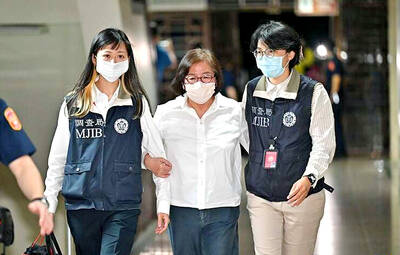Aborigines might be allowed to hunt non-endangered animals for ritualistic or religious purposes during traditional festivals, Minister of the Interior Chen Wei-zen (陳威仁) said on Wednesday, adding that the ministry is considering relaxing regulations on national parks to implement the plan.
Chen made the remarks in response to media queries about the case of Bunun hunter Tama Talum, also known as Wang Kuang-lu (王光祿), whose prison sentence for killing a wild boar and a Formosan serow in 2013 was upheld by the Supreme Court in October last year.
The issue was highlighted by a protest by representatives of 14 Aboriginal communities on Tuesday.
Fifty-six-year-old Wang was sentenced to three-and-a-half years in prison for breaking laws on gun control and wild animal conservation.
Wang told police that he found the gun in the mountains and that he was hunting lean meat for his ailing 92-year-old mother, as the food products sold in “plains markets” was too fatty for her.
His conviction triggered protests by members of the Bunun and other Aboriginal communities, who said the law was too harsh against Aborigines for whom hunting is a traditional way of life.
Chen said that the ministry is in the process of drafting a proposal to amend the National Park Act (國家公園法), that would permit Aborigines to hunt in national parks for ritualistic or religious purposes, on the condition that their prey is not under imminent threat of extinction and is not in limited numbers.
The proposed amendments are to be designed to be more respectful to Aborigineal culture, modeled after the Forestry Act’s (森林法) protections of Aboriginal rights, he added.
To curtail farmland losses, the National Land Planning Act (國土計劃法) is to zone the nation’s land into four categories — agricultural development areas, national reserve areas, marine resource areas and urban development areas — and allow governmental construction projects for dams, airports, highways and other infrastructure only in designated urban-development areas, Chen said.
When asked to comment on whether the National Land Planning Act would authorize the government to demolish illegal hostels and hotels, such as those found near Nantou County’s Cingjing Farm (清境農場), Construction and Planning Agency Director-General Hsu Wun-long (許文龍) said legal research by his agency is pending the act’s promulgation.
Additional reporting by CNA

Costa Rica sent a group of intelligence officials to Taiwan for a short-term training program, the first time the Central American country has done so since the countries ended official diplomatic relations in 2007, a Costa Rican media outlet reported last week. Five officials from the Costa Rican Directorate of Intelligence and Security last month spent 23 days in Taipei undergoing a series of training sessions focused on national security, La Nacion reported on Friday, quoting unnamed sources. The Costa Rican government has not confirmed the report. The Chinese embassy in Costa Rica protested the news, saying in a statement issued the same

Taiwan is to extend its visa-waiver program for Philippine passport holders for another year, starting on Aug. 1, Minister of Foreign Affairs Lin Chia-lung (林佳龍) said on Friday. Lin made the announcement during a reception in Taipei marking the 127th anniversary of Philippine independence and the 50th anniversary of the establishment of the Manila Economic and Cultural Office (MECO) in Taiwan, the Ministry of Foreign Affairs said. The decision reflected Taiwan’s commitment to deepening exchanges with the Philippines, the statement cited Lin as saying, adding that it was a key partner under the New Southbound Policy launched in 2016. Lin also expressed hope

Temperatures in New Taipei City’s Sindian District (新店) climbed past 37°C yesterday, as the Central Weather Administration (CWA) issued heat alerts for 16 municipalities, warning the public of intense heat expected across Taiwan. The hottest location in Taiwan was in Sindian, where the mercury reached 37.5°C at about 2pm, according to CWA data. Taipei’s Shilin District (士林) recorded a temperature of 37.4°C at noon, Taitung County’s Jinfeng Township (金峰) at 12:50 pm logged a temperature of 37.4°C and Miaoli County’s Toufen Township (頭份) reached 36.7°C at 11:40am, the CWA said. The weather agency yesterday issued a yellow level information notice for Taipei, New

CASE: Prosecutors have requested heavy sentences, citing a lack of remorse and the defendants’ role in ‘undermining the country’s democratic foundations’ Five people affiliated with the Chinese Nationalist Party (KMT), including senior staff from the party’s Taipei branch, were indicted yesterday for allegedly forging thousands of signatures to recall two Democratic Progressive Party (DPP) lawmakers. Those indicted include KMT Taipei chapter director Huang Lu Chin-ru (黃呂錦茹), secretary-general Chu Wen-ching (初文卿) and secretary Yao Fu-wen (姚富文), the Taipei District Prosecutors’ Office said in a news release. Prosecutors said the three were responsible for fabricating 5,211 signature forms — 2,537 related to the recall of DPP Legislator Wu Pei-yi (吳沛憶) and 2,674 for DPP Legislator Rosalia Wu (吳思瑤) — with forged entries accounting for